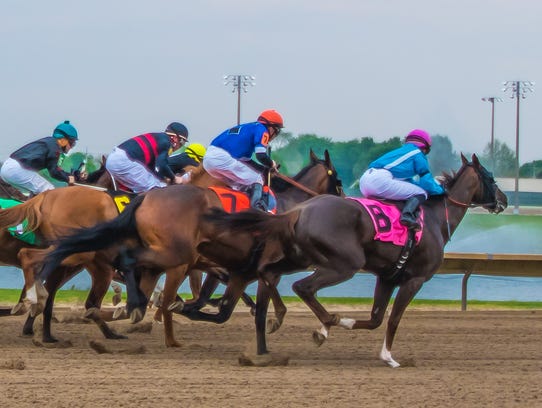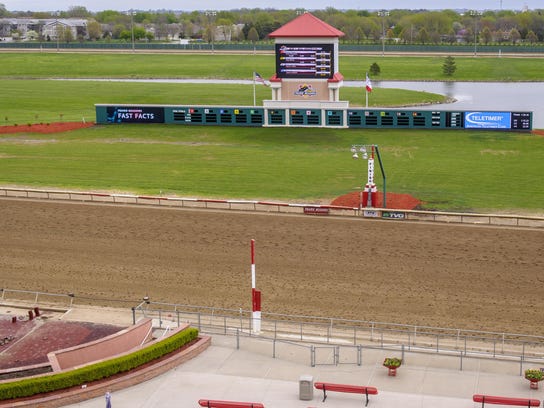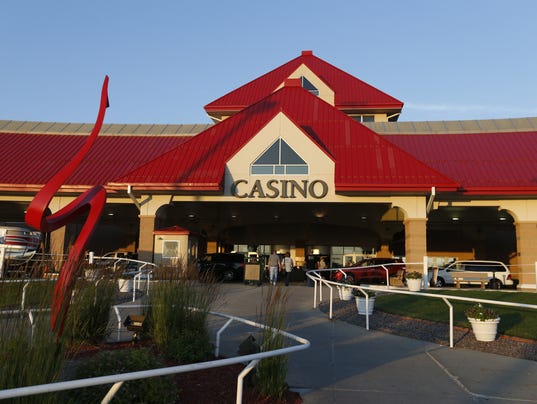
Here's how Prairie Meadows' loss of nonprofit status could affect Des Moines and Polk County on a financial scale. Rachel Mummey/Register photos
Reclaiming tax-exempt status is only the start of Prairie Meadows’ battle against the IRS.
If Prairie Meadows wins that fight, the nonprofit racetrack and casino still faces a potentially greater threat: The IRS contends that slot machines, table games, hotel, restaurant and other nonracing revenue streams should still get taxed as “unrelated business,” according to an IRS audit released last week.
That could be an even worse result, threatening its existence as a viable operation. Either scenario would be bad news for central Iowa's local governments and charitable organizations, which receive tens of millions of dollars from Prairie Meadows each year.
The IRS report argues first and foremost that the full operation should lose tax-exempt status and pay up to $60 million in back taxes and penalties owed from 2012 to 2014. If Prairie Meadows successfully appeals that effort, another set of arguments makes the case that its 501(c)(4) nonprofit status applies only to horse racing.
Polk County Supervisor Angela Connolly said both of the looming threats from the IRS would be troubling for the casino and the greater Des Moines area.
“That $60 million figure is a little scary," Connolly said.
RELATED: Prairie Meadows points finger at whistleblower
As of Friday afternoon, she said she hadn't read the full IRS report or the casino's response. She also questioned what substantial role the county can play in the pending judgment.
“I don’t know how we can fight it or what kind of role we’re going to have,” she said, but "I don't want them to lose their nonprofit status, period."
Here's why taxing everything except horse racing at Prairie Meadows could be devastating: Horse racing loses money at Prairie Meadows — $23.6 million in 2014 alone, according to financial data provided by Prairie Meadows. Creating a tax-exempt silo around the racetrack would mean those losses cannot be claimed as tax deductions at the casino.
 Buy Photo
Buy PhotoAnd they're off! Horses race during Prairie Meadows' special Kentucky Derby races Saturday, May 7, 2016, in Altoona. (Photo: Meenakshi Chelsea Van Zee / For the Register)
Today, Prairie Meadows treats the racetrack like an operating expense. Most of the cost is tied to the racing purse for winning horse owners. The casino's slot machines and table games pay that cost, according to casino officials.
“You can’t separate horse racing from the casino,” said Brian Wessels, chief financial officer at Prairie Meadows.
Put another way: “The purses awarded are a necessary — and relatively minor — cost of running the facility,” reads the appeal letter from Prairie Meadows, prepared by Marcus Owens, a Washington, D.C., tax attorney.
MORE COVERAGE:
That’s the essence of Prairie Meadows’ counterargument that ha’s been submitted in a formal IRS appeal.
“When there was only horse racing here, the facility went bankrupt,” Wessels said.
That was in the mid-1990s, before the Legislature approved the use of slot machines in Iowa. Revenue from the slots bailed out the racetrack and put Prairie Meadows' financials in the black.
Prairie Meadows now channels tens of millions of dollars into Polk County government, central Iowa cities, schools and charities each year. The annual surplus exceeds $20 million, after paying salaries, operating expenses and a $15.6 million annual rent to Polk County.

Prairie Meadows installed an improved digital display for scoring while getting ready in April for the 2016 racing season. (Photo: Mark Davitt/Special to the Herald-Index)
The IRS investigators argue that giving away all profit does not qualify an organization for tax-exempt status. Instead, the organization must offer a nonbusiness service that reduces a government burden.
“The operation of gaming activities is not an exempt activity,” the audit report reads.
It goes on to explain why “unrelated business” taxes should apply to the gaming, hotel, restaurant and even ATM revenue at Prairie Meadows.
PREVIOUS: IRS: Prairie Meadows owes up to $60 million
“This is a commercial activity that is carried on by for-profit entities … and does not contribute importantly to the accomplishment of an exempt purpose,” the report says.
Regardless of the outcome of Prairie Meadows' appeal, the $60 million owed in back taxes and penalties will likely change, according to Prairie Meadows officials and tax law experts.
Andy Grewal, a law professor at the University of Iowa who specializes in federal tax research, said the IRS “tends to throw everything but the kitchen sink in that first report.”
“Typically, the IRS casts a wide net to begin with, and the actual settlement number could be smaller,” Grewal said.
As for a time frame, neither party should expect much resolution anytime soon, he said.
“It could take years, and if it goes to litigation, a decade would be hardly unusual,” he said.
Read or Share this story: http://dmreg.co/24ZR6Bb
| < Prev | Next > |
|---|







 Copyright © 2025 ToCasino.net Online Casino. All Rights Reserved. Designed by
Copyright © 2025 ToCasino.net Online Casino. All Rights Reserved. Designed by